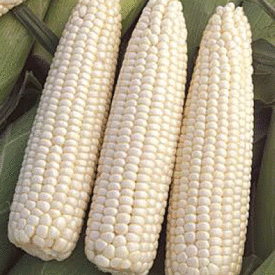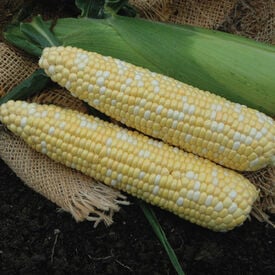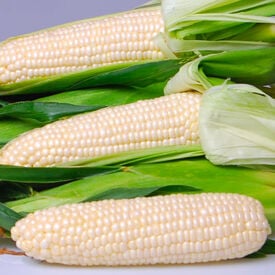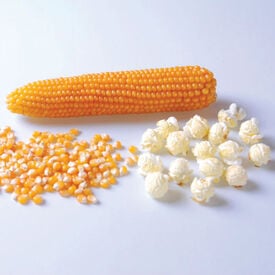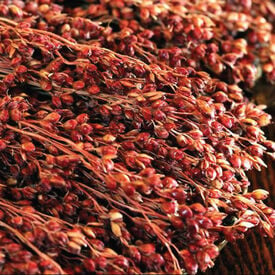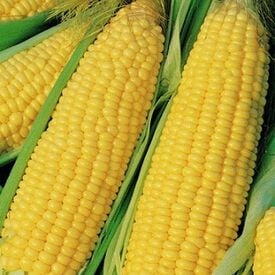Learn More
Dublin corn produces beautiful tall stalks that can reach 8-10' with 8-9" long ears. Originating from Dublin, Ontario this corn was developed for a short growing season. A high protein percentage of 10-11%, this variety can be used for flour, cornmeal, and by distilleries.
Yellow Cónico corn is a traditional Mexican heirloom variety known for its distinctive, conical-shaped ears and vibrant yellow kernels. This Yellow Cónico is grown in the highlands of Atlacomulco in Estado de México and produces a light and lovely golden masa. This corn is highly prized for its versatility and excellent texture, making it ideal for a wide range of culinary uses, from making masa for tortillas and tamales to being ground into flour for baking. The plant is hardy and adaptable, thriving in a variety of climates, though it particularly excels in regions with warm temperatures and well-drained soil. The kernels have a slightly sweet, rich flavor that stands out in both savory and sweet dishes. Yellow "Amarillo" Cónico corn has deep cultural significance in Mexico, where it has been grown for centuries, and its open-pollinated nature makes it an excellent choice for sustainable farming practices. Whether grown for food or as part of a seed-saving program, Yellow Cónico corn continues to be a cherished variety for its unique taste and historical roots.
Green Field corn produces an abundance of tall (8-10') stalks with 8-9" long ears. Developed from Reid's Yellow Dent, this corn produces bright yellow, long and narrow 14-kernel row ears. Green Field was the name of the farm that this corn was first produced on. Reported yields of 190 bu/acre in the boot heel area of MO.
Devotion is a delicious sweet white corn perfect for market use. This corn variety is a high quality white sh2 with a superb taste. This corn variety has 8-inch ears with a nice husk package and good tip cover. Devotion corn plant will produce 16 to 18 rows of attractive, bright white kernels.
Kickoff XR is a high-performance corn seed designed to enhance early growth and overall yield potential. It features advanced genetics that provide excellent seedling vigor, making it well-suited for a variety of soil types and planting conditions. This seed is engineered to help crops establish strong root systems, improving resilience against environmental stresses like drought or inconsistent rainfall. With Kickoff XR, farmers can expect better early-season growth, more uniform emergence, and the potential for higher overall yields at harvest, making it a valuable choice for maximizing productivity in diverse agricultural settings.
Eden is a game-changer as it unites the exceptional quality of taste and texture of the Augmented varieties with emergence and vigor. This high yielding and uniform sweet corn have a great tip fill and beautiful white kernels with even rowing. It is also easy to pick, packs well, and has held power from field to consumer. In trial after trial, Eden has proven itself to be exceptional on every level.
Mosby White Prolific is an old and popular dent corn variety first developed in 1876 by J.K. Mosby of Mississippi. Produces strong and tall stalks often reaching 10-12' tall with 2-4 ears. Ears often reach 8-9" with creamy white kernels. By the early 1900s, most of the major Southern seed houses, as well as newspapers full of farmer's advertisements, were selling the seed. Although now fairly rare, 'Mosby Prolific' was once extensively grown for feed and silage; particularly in the South and Gulf States.
R400MR is a superior mushroom variety that has excellent plant health with broad dark green leaves, a study single stalk, and resistance to most diseases. The large single ears give it one of the highest yield potentials in the market today. The rich orange kernel size is exceptional at 47 k/10g while popping about 80% ball and mushroom flakes. High resistance: Common Rust, NCLB, Grey Leaf Spot, and Goss’ Wilt.
Pink Xocoyul corn is a unique heirloom variety from the mountainous regions of Oaxaca, Mexico, renowned for its striking pinkish kernels and its rich, nutty flavor. This Tlaxacaltecan varietal of pink heirloom corn is akin to a Chalqueño, but a bit denser. This traditional corn is often grown in small, family-run farms and is prized for its ability to thrive in high-altitude, temperate climates. While it is traditionally used for atole dulce, a warm, sweet masa beverage, Xocoyul lends itself seamlessly to a variety of masa applications, such as quesadillas with fresh quesillo or festive pink tamales. Beyond its culinary uses, Pink Xocoyul corn is valued for its cultural significance in Oaxacan cuisine, where it plays a central role in regional food traditions. Like many heirloom varieties, it is open-pollinated, making it an excellent choice for sustainable farming and seed-saving. This beautiful corn not only adds vibrant color to dishes but also helps preserve a piece of Mexico's agricultural heritage.
Red Head broom corn produces a tall spray of seed heads at the top of the plant, laden with shiny red tiny sorghum seeds that birds love. Incorporate seeds into edible bird-feeder wreaths or leave the 2–3' sprays intact to add variety to traditional fall decorations.
Red Cónico corn is a striking heirloom variety from Mexico, known for its deep red kernels and distinctive conical shape. This traditional corn is prized for its rich, nutty flavor and excellent texture, making it ideal for grinding into masa for tortillas, tamales, or for use in savory dishes like soups and stews. The plant is hardy, thriving in a range of climates, particularly in high-altitude regions, and is often grown in smaller, family-owned farms where it has been cultivated for generations. Red "Rojo" Cónico corn’s deep cultural significance in Mexican cuisine, along with its vibrant color and versatility, make it a favorite for both home gardeners and farmers looking to preserve traditional varieties. Its open-pollinated nature also makes it a great choice for sustainable farming and seed saving.
Truckers Favorite Yellow is an heirloom yellow dent field corn that is excellent for roasting or frying or used as a dent. This variety stays fresh for a long time. Truckers Favorite Yellow stalks are 8-9' tall and ears are 8-10" and have 14-18 rows. This corn has high yields with good soil fertilization and is an excellent foliage for early fodder.



